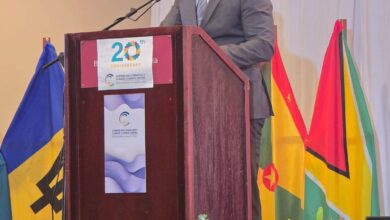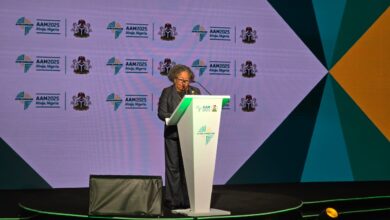CHRIST CHURCH, BARBADOS – CARICOM welcomes elements of a joint letter on the World Trade Organization (WTO) Doha Development Agenda (DDA), issued by European Commissioners for Trade and Agriculture, Pascal Lamy and Franz Fischler, respectively. This according to the Director-General of the Caribbean Regional Negotiating Machinery (RNM), Ambassador Dr. Richard Bernal. Ambassador Bernal was speaking to members of the international press, in London, May 11, where he is attending the Fourth Meeting of the UK-Caribbean Forum. The joint letter issued by the Commissioners, to their WTO Member counterparts, May 9, sets out a series of concessions and offers – for select areas under the DDA – meant to narrow gaps on points of contention. It was circulated only a few days after Trade Ministers from the United States, the European Union (EU), Brazil, South Africa (both Brazil and South Africa are leading members of the G-20) and Kenya (representing the G-90) met in London, May 1 to 2, as part of efforts to revive the troubled WTO Doha Round. The letter was issued in the same week a “mini-ministerial” meeting is to take place on the margins of the annual Ministerial Council of the Organization for Economic Cooperation and Development (OECD). “This is certainly no coincidence”, said Ambassador Bernal, who is set to attend the “mini-ministerial” meeting in Paris, May 13 to 14. “The substance of the joint letter will be considered in greater detail at the pending “mini-ministerial””. The letter outlines what the EU views as key areas in which progress is needed if concord is to be reached on a Framework Agreement, by July this year. It focuses on: Agriculture, non-Agricultural Market Access (NAMA), Services, the “Singapore Issues” (i.e. Investment and Competition rules, Trade Facilitation and transparency in Government Procurement), and ‘development questions’. On Agriculture, the EU has signaled that it is “ready to move on export subsidies”. However, this is conditional on ‘overall’ balance in Agriculture talks; namely, “an acceptable outcome” for market access and domestic support talks, the two other pillars in farm trade liberalization talks, and full parallelism on all forms of export competition. On market access, the letter touts a modified blended formula. There is recognition, though, that ‘flexibility’ is needed to take into account ‘developing country sensitivities’. On domestic support, there is an expression of intent for “substantial reduction of all forms of trade-distorting subsidization”; emphasis is on a course of action for dealing with specific issues. Dr. Bernal remarked, “the significance of compromise on Agriculture rests on the fact that agricultural trade reform remains the centre-piece of global trade talks. Bridging differences on Agriculture is critical to the possibility of significant movement in negotiations”. Regarding non-Agricultural Market Access, Ambassador Bernal noted that the proposal for product-based exceptions hinged on sensitivities of developing countries, essentially “less than full reciprocity”, is encouraging and viewed favorably. He also indicated he was pleased to note the conciliatory stance taken as regards the “Singapore Issues”. The RNM head signaled CARICOM has taken special notice of a proposal as regards special and differential treatment (S&DT). Specifically, the suggestion that in Agriculture and NAMA vulnerable developing countries would “not have to open their markets beyond their existing commitments, and should be able to benefit from increased market access offered by both developed and advanced developing countries”. Sources have signaled the onus taken in this respect is commendable, and reflects a broad appreciation for the position of small developing economies. Ambassador Bernal has hailed the EU initiative as “a positive development for the beleaguered Doha Round”. He said it constitutes an important gesture, especially to developing countries, as regards the EU’s commitment to providing impetus to problematic negotiating areas that are contributing to gridlock in global trade talks. “CARICOM is in the process of carefully considering the initiative and the flexibilities it presents; generally speaking, the joint letter is revealing and helpful, both in its tone and substance”, he stated. Hon. Clement Rohee, CARICOM Ministerial Spokesperson for WTO issues and Minister of Foreign Trade and International Cooperation, Guyana, will take part in the Paris “mini-ministerial” meeting. In addition to Ambassador Bernal, RNM Coordinator for WTO Matters, Dr. Peter Gonzales, will accompany him. In addition to Trade Ministers from OECD Member Countries, fourteen non-Member Ministers are expected to participate in the work of the Ministerial on trade issues, namely: Argentina, Bangladesh, Botswana, Brazil, Chile, China, Guyana, Hong Kong, India, Indonesia, Kenya, Russia, Singapore, and South Africa. On May 13, the Chair, Mr. Canales Clariond, Secretary of Economy, Mexico, will open the session; there will be a Trade Working Dinner in the evening. On May 14, all OECD Ministers as well as Ministers from invited non-Members and Observers will participate in a session slated for 9:15 am to 1:00 pm. Mexican Foreign Minister Luis Ernesto Derbez, the Chair of this session, will deliver opening remarks, after which he is expected to designate lead discussants. A final news conference is scheduled to be convened in the afternoon. The ‘Chair’s Summary of the Meeting’ will be issued following this news conference. Nine months have passed since the collapse of the Fifth WTO Ministerial last September, during which time talks have stalled given a preponderance of setbacks in its aftermath. The Paris “mini-ministerial” meeting is part of a series of informal forums intended to advance WTO talks.
News Letter
Subscribe to our mailing list to get the new updates!
Check Also
Close





